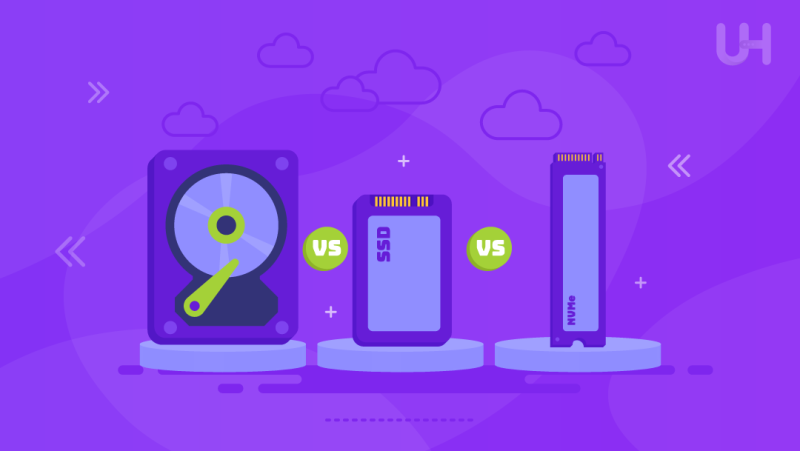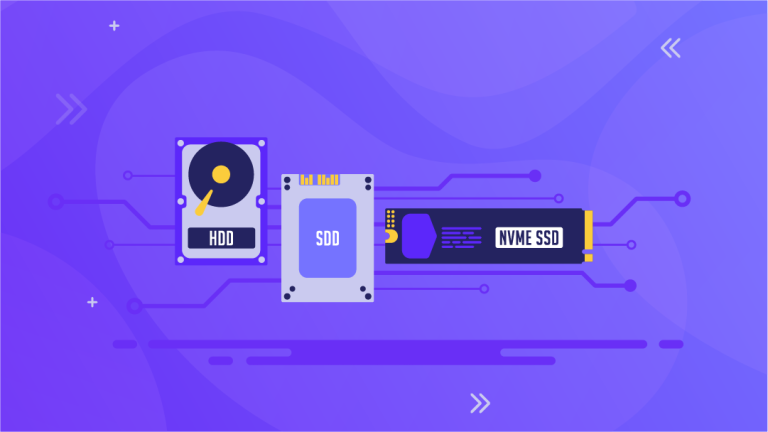Fast data access, low loading times, and high reliability are crucial nowadays. The choice of disk for fast WordPress hosting has a significant impact on the performance and efficiency of websites. What are the differences between the three main types of disks: HDD, SSD, and NVMe?
Storing data on web servers requires consideration of various factors, such as data access speed, reliability, costs, and the specific operation of the website. All these factors largely depend on the disk type of the hosting server.
HDD vs SSD vs NVMe: Key Differences
Hard Disk Drives (HDDs) use mechanical components for data read and write operations, such as spinning disks and magnetic heads. Solid State Drives (SSDs), on the other hand, are based on semiconductor technology and have no moving parts. Data is stored in integrated circuits, allowing faster data access and reducing the risk of mechanical failures.
NVMe (Non-Volatile Memory Express) is the latest generation of SSDs that use the NVMe interface for communication with the computer, enabling even faster data access compared to traditional SSDs connected via the SATA interface.
HDDs are relatively cheaper than SSDs and NVMe, making them attractive for low-budget projects. They also come in larger capacities than SSDs and NVMe. However, their operation is slower due to mechanical components, which can lead to longer website loading times – a severe obstacle in the world where the speed matters.
SSDs offer faster data access and better performance than HDDs, and NVMe drives are the most advanced solution, offering the highest data access speed. However, their price may be higher than HDDs and SSDs, which may affect availability for projects with limited budgets.
HDD vs SSD Storage: Performance and Reliability Analysis
HDDs boast large capacities and are relatively inexpensive. They can be an attractive solution due to their disk space and relatively low costs. However, SSDs offer incomparably faster data access and better performance.
In web hosting, where page loading speed is crucial for user experience, SSDs can contribute to improving website performance and reducing server response times, potentially overshadowing the advantage of HDDs, namely their low price and large capacity. This holds particularly true for online enterprises catering to a substantial user base that demands superior server performance and reliability.
Elevate Your Business with NVMe Hosting
NVMe technology provides significantly faster data access speeds compared to traditional storage options like HDD or SATA SSD. This means your website will load faster, resulting in a smoother user experience and potentially higher conversion rates. UltaHost guarantees you that on all servers, it will provide you exclusively with lightning-fast SSD NVMe.
SATA SSD vs NVMe: Performance vs. Costs
SSDs need to be clearly distinguished based on the bus connecting them to the motherboard. Thus, there are drives connected via SATA and NVMe technology. SSD SATA drives use the SATA interface, which has been widely used for years but offers data transfer speed limited by interface constraints. In contrast, NVMe drives use the PCIe interface, enabling significantly higher data throughput and shorter access times.
In web hosting, where server response time is crucial for users, choosing between SATA SSD vs NVMe drives can be exceptionally challenging. NVMe drives are typically much faster but also more expensive and smaller. However, if fast data access is a priority, NVMe drives may be the preferred solution. The best example are online games that require a lightning-fast NVMe disk game server.
As one might expect, NVMe drives are more expensive than SSD SATA. Therefore, it is worth considering whether the potential benefits of higher performance justify the additional costs. In some cases, especially for smaller websites or applications with lower traffic, SSD SATA drives may be sufficient, and their lower price may be more favorable. However, for large-scale websites or applications requiring maximum performance, investing in NVMe drives may be entirely justified.
SSD vs NVMe Speed: Is it Worth Investing in NVMe?
Disk speed is crucial for website performance. NVMe drives, utilizing the PCIe interface, offer significantly higher read and write speeds compared to drives using the SATA interface. Instant VPS hosting with fast drives allows websites to load faster, resulting in better user experiences and favorable conversion rates.
The performance of NVMe drives is particularly beneficial for applications requiring fast data access, such as databases, e-commerce websites, or transactional applications. Consequently, websites hosted on servers with NVMe drives can handle higher traffic and provide better user experiences even during peak hours.
It is worthwhile to carefully consider whether the potential benefits of using NVMe drives will yield tangible results. For smaller projects, SATA SSD drives may suffice, and the price difference may not translate into significant effects. Therefore, the final decision should take into account both the website’s requirements and the available hosting budget.
Conclusion
The comparison of HDD vs SSD vs NVMe drives reveals that each has unique features that can influence the choice of the appropriate disk type for web hosting.
HDDs are the cheapest and offer large capacities, which can be beneficial for projects with a large amount of static data. However, their limited read and write speeds may be a disadvantage for applications requiring fast data access, making them unsuitable for most modern websites. They may be useful only for projects with high data storage needs that do not require high performance, such as file archiving or backups.
Most websites and web applications should utilize SSD drives, especially those based on the NVMe interface, which offer significantly higher speed and performance. NVMe SSD hosting is ideal for websites with high-performance requirements and applications requiring fast data access.
However, due to their higher cost, they may be less attractive for smaller projects with limited budgets. Ultimately, the choice between HDD vs SSD Storage and SATA vs NVMe, depends on the project’s individual needs and the available budget. You must determine whether your clients will allow you to compromise between performance and price or whether they will expect the highest possible speed.
The final recommendation for choosing the appropriate disk for web hosting depends on the project’s individual needs, available budget, and performance expectations. Before making a decision, it is worth not only comparing SSD vs NVMe speed, but thoroughly examining the project’s requirements and comparing the advantages and disadvantages of each type of disk.
If you enjoyed this article, then you’ll love UltaHost hosting platform. Do you want to establish a stronger online presence without breaking the bank? Get our cheap VPS Hosting! Our powered infrastructure and hardware focus on auto-scaling, performance, and security. Let us show you the difference! Check out our plans!
FAQ
What are the key differences between HDD, SSD, and NVMe drives?
HDDs use mechanical components for data read and write operations, while SSDs and NVMe drives are based on semiconductor technology with no moving parts, offering faster data access and reduced risk of mechanical failures. NVMe drives, utilizing the NVMe interface, provide even faster data access compared to traditional SSDs connected via SATA.
How does the choice between drive types affect hosting performance?
HDDs are relatively cheaper with larger capacities, making them suitable for low-budget projects, but their slower operation may lead to longer website loading times. SSDs offer faster data access and better performance, contributing to improved website performance and reduced server response times. NVMe drives provide the highest data access speed but may come at a higher cost, affecting availability for projects with limited budgets.
What factors you should considered when choosing between SATA and NVMe?
SATA SSD drives use the SATA interface with limited data transfer speeds, while NVMe drives utilize the PCIe interface, enabling significantly higher data throughput and shorter access times. The choice between SATA SSD and NVMe drives depends on the project’s requirements for speed, performance, and budget.
Is it worth investing in NVMe hosting for web servers?
NVMe hosting offers significantly faster data access speeds compared to traditional storage options like HDD or SATA SSD, resulting in faster website loading times and better user experiences. However, the higher cost of NVMe drives may be less attractive for smaller projects with limited budgets, and the decision should consider whether the potential benefits of higher performance justify the additional costs.









